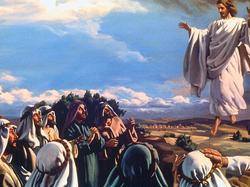
Man's first great work is personal; and has reference to his own restoration. To renounce his separation, and to unite himself with God, is a work which cannot be postponed or made subservient to any other. Being, by God's grace, personally restored to a better state, hIs next business is to aid in the restoration of others. And, in doing this, the first thing is to extend the announcement of Christ's coming, and of the blessed influences connected with it; — in other words, to preach the Gospel.
The last words of our blessed Saviour, as they are recorded in the Gospel of Matthew, were these: "And Jesus came and spake unto them, saying, All power is given unto me in heaven and in earth. Go ye, therefore, and teach all nations, baptizing them in the name of the Father, and of the Son, and of the Holy Ghost; teaching them to observe all things whatsoever I have commanded you; and lo, I am with you always, even unto the end of the world."
The command of the Savior is explicit. The apostle Paul inculcates the same great duty, and assigns an obvious and urgent reason for it. "Whosoever believeth on him shall not be ashamed. For there is no difference between the Jew and the Greek; for the same Lord over all is rich unto all that call upon him. For whosoever shall call upon the name of the Lord shall be saved. How, then, shall they call on him in whom they have not believed? And how shall they believe in him of whom they have not heard? And how shall they hear without a preacher? And how shall they preach except they be sent? As it is written, How beautiful are the feet of them that preach the Gospel of peace and bring glad tidings of good things!"
In the early periods of the Christian era, the command of the Savior met with a prompt and believing response. The primitive Christians, filled with the spirit of their Divine Master, went abroad in all directions and spread everywhere the news of a Savior crucified, a Savior risen. Laborious, and full of faith and of the Holy Ghost, they not only endured all things but suffered all things; not hesitating to lay down their lives in support of the great truths they declared. At no time since have these efforts of the church altogether ceased; although in some periods they have not been made with the same degree of wisdom and earnestness. But while we remember the delinquencies of Christians, it is pleasing to reflect, that the followers of Christ, at the present time, under different names but animated by the same spirit, seem to be preparing for a final and victorious conflict. It appears to be their design and hope, with the divine favor resting upon their labors to rouse themselves at last as one man, and to carry the Gospel of the Son of God to every heathen dwelling. In this great work let every Christian cooperate, with some proper sense of the greatness of the undertaking, and of the obligations which rest upon him. At the present eventful period, no man, who has had a fair opportunity to develop Christian principle, and to learn the weight of Christian responsibility, ought to look upon himself as a follower of Christ, unless he feels beating in his bosom something of the spirit which animated the Johns and Pauls of primitive times.
Edited from A Treatise on Divine Union (1851) Part 7, Chapter 4 by Thomas Cogswell Upham. His blog is managed by Craig L Adams and can be found here: http://thomascupham.blogspot.com
 RSS Feed
RSS Feed